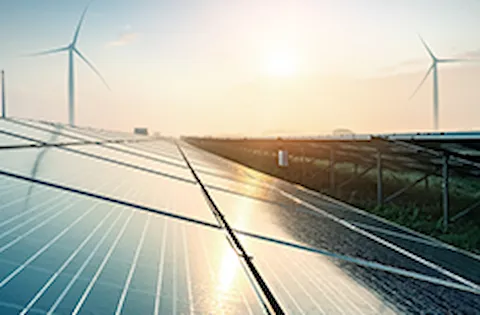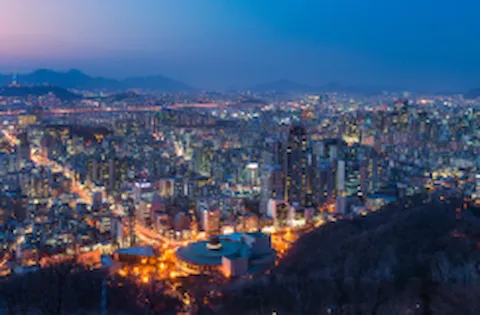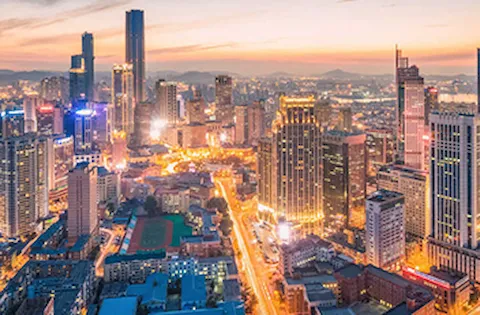Lightspeed: Five DNV colleagues reflect and share their EE ambitions for 2022
In the spirit of celebrating 2021’s Energy Efficiency Day on October 6, we asked some of our colleagues for reflections from this past year and what they see ahead in energy efficiency moving into 2022.
Today we at DNV are celebrating #eeday2021! 2021 has been a proving ground across DNV’s many areas of work. When it comes to energy efficiency, our track record has been consistent, our capabilities have grown, but most of all have been adapted to the world of unprecedented challenges. Our customers call upon us for dynamic approaches at this critical moment. In the spirit of celebrating 2021’s Energy Efficiency Day on October 6, we asked some of our colleagues for reflections from this past year and what they see ahead in energy efficiency moving into 2022.
In 2021, employees from DNV’s Markets & Risk and Energy Management businesses collaborated on the development of a joint offering to assist our clients with building equity into their energy efficiency program design and help bridge the gap between utilities and the communities they serve through the energy transition. Recent extreme weather events from climate change, a global pandemic, and racial injustice have all disproportionally affected marginalized communities—and; eliminating energy inequities when it comes to our client’s operations and business practices has never been more important. Through our work on DNV’s Equity in Clean Energy group, Shawn Bodmann and I have begun development of a Equity Accelerator roadmap that is customizable to individual client’s specific equity goals. This tool aims to:
- Improve customer reach and participation in energy efficiency programs
- Expand diversity of their workforce development programs
- Propose innovative financing mechanisms and rate design structures to improve accessibility to energy services and wealth generating opportunities
- Propose recommendations to achieve equitable distribution of investments in efficiency and renewable energy
- Provide a community engagement plan that can help utilities build trust with the communities they serve
Looking ahead at 2022, we hope that the Equity Accelerator will help our clients set priorities to address current inequities and provide innovative, clean energy program solutions that are effective, replicable, and scalable at benefiting at-risk communities within their territory.
Be it reducing energy costs in homes and businesses, creating jobs in diverse communities, or impacting greenhouse gas emissions, Energy Efficiency Day drives home the importance of taking care of our world both individually and collectively. After 2020, the entire world was at a standstill—giving us time to sit with our thoughts, re-evaluate our lives, and prioritize the things that spark a fire within us. In my work as a marketing specialist who promotes the benefits of energy efficiency, I get to intertwine my professional work with a passion for helping people in diverse communities find solutions to enhance their quality of life. Individuals in communities that are experiencing economic hardship can benefit from energy efficiency by making small changes in their lives and businesses.
In 2022, my personal goal is to become more intentional and committed to impacting our society through social media engagement, participating in global virtual celebrations, and reducing energy waste within my own community. As a member of both the Council on Women in Energy and Environmental Leadership (CWEEL) and DNV’s Diversity, Equity and Inclusion committee, I am most excited to continue engaging communities in an effort to make energy efficiency equitable and inclusive.
In 2021, we launched a virtual assessment program with NorthWestern Energy. We leveraged our strong digitalization capabilities to provide virtual services and inspections to ensure we can deliver client goals and demonstrate the flexibility needed to adapt to a changing environment and a world effected by the pandemic. DNV has used remote inspection, virtual assistance, and video-enabled tools across our business for years, and now we’ve innovated these technologies to seamlessly migrate our program operations and customer delivery to a safe virtual environment. We deployed a customer engagement strategy to match different customer preferences for virtual engagement and privacy which includes a remote smart-device-based tool called Blitzz. To date, we have completed over 680 virtual assessments for residential customers with a customer satisfaction rating over 90%. Our ambitions for 2022 are to engage with more utilities through co-funded pilots to continue demonstration of the effectiveness of our virtual service capabilities. Our program approach is based on DNV’s virtual technology platform called “Personalized Energy Plans” (PEP Talks). Our virtual services for energy-efficiency improvements will surely run in parallel to property owners engaging in greater electrification in the year to come.
Our team of conservation specialists find satisfaction in educating customers about energy efficiency. Among these projects is our direct install program on behalf of Pasadena Water & Power wherein our representatives conduct energy audits using our proprietary software called RECAP in conjunction with measures like irrigation evaluation, installing low flow water measures and LED bulbs. These visits can qualify the utility customer for advanced direct install measures such as weatherizing the home, irrigation upgrades and water efficient toilets. When Covid-19 hit our program was no longer able to conduct face to face visits. Customers were consuming more energy while sheltered in place, making the importance of our work more vital than ever. We identified a secure program called Blitzz which allowed us to conduct secure facetime appointments with customers on our tablets. With this new tool, we were able to resume appointments virtually and educate them on how to save energy. The adjustment was such a success that we started using Blitzz on other programs for inspections. Among other clients, the City of Pasadena was so happy with our ability to respond to customer needs that work has already begun to scale the program in 2022.
Energy efficiency is critical to both meeting the goals of the Paris Climate Agreement and helping us to a net-zero future where people can enjoy a safe, enjoyable, and habitable future. While the United States has a good track record of creating energy performance standards and incentivizing smaller technologies, it has been slow to adapt its policies and regulations to emerging technologies, dire scientific warnings, and public pressure for climate action. While grants and rate-payer funded energy efficiency programs have been successful in recent years, states and cities find struggle with an unpredictable level of funding with respect to carbon reduction. Policymakers can help remedy this by incentivizing emerging technology, creating new code baselines, and using technology to adequately measure goals, strategies, and policies. By establishing set plans, governments can efficiently benefit historically excluded and vulnerable communities while promoting greater electrification and energy efficiency programs. DNV is poised to assist utilities and other organizations in reducing carbon emissions and improving quality of life through energy efficiency and has acted as a technical advisor to numerous California cities working to pass progressive building reach codes, advance building decarbonization, and provide consumers with cost-effective electrification. Protecting life, property, and the environment depends on urgent policy progress—creating a cleaner and greener tomorrow for us all.
10/6/2021 5:00:00 AM






